Let us now go back in time from the time of Christ and the subsequent destruction of the 2nd Temple, to the design and construction of the 1st Temple. Before we begin, let us ask the question: Why is the Temple so important?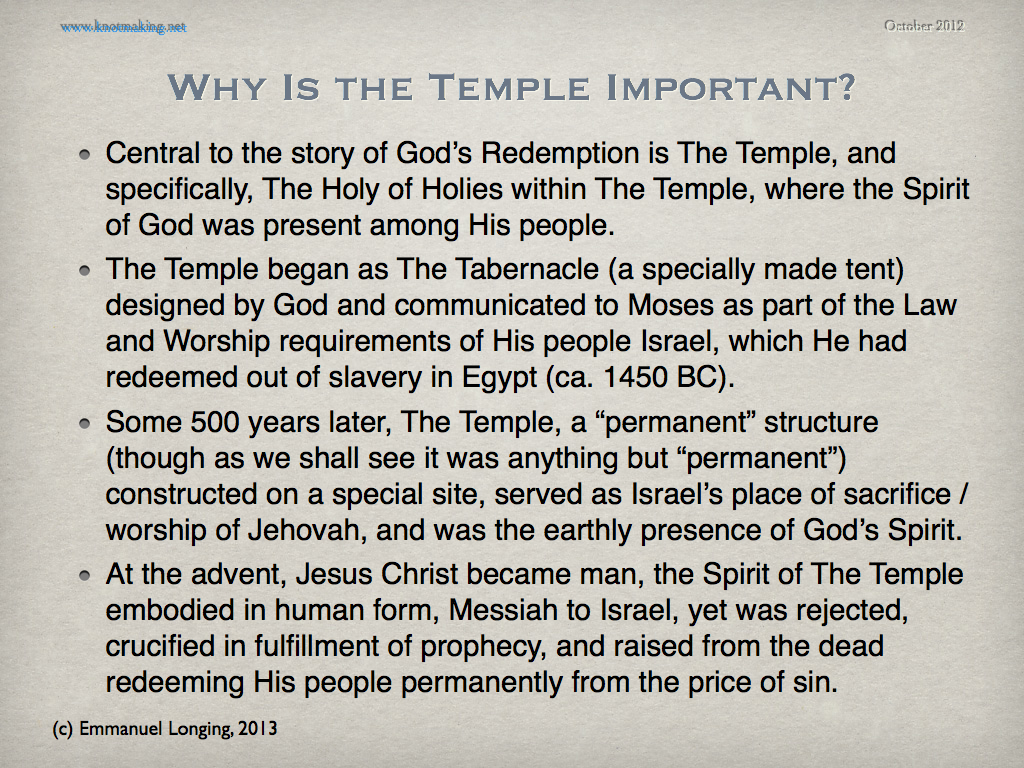 After Eden, when our first parents were cast out because sin had entered the human race, men have been separated from their God and Creator. There was no way back into the Garden. God’s absolute Holiness and man’s knowledge of good and evil could not be in close companionship. God, however, began the long process of Redemption, and the Restoration of All Things. The Temple played a central role in displaying God’s Holiness, His righteous requirements, His ever present love. Man during those Temple times by their knowledge of the “good,” were drawn to the Temple in humility, worship, sacrifice, and adoration.
After Eden, when our first parents were cast out because sin had entered the human race, men have been separated from their God and Creator. There was no way back into the Garden. God’s absolute Holiness and man’s knowledge of good and evil could not be in close companionship. God, however, began the long process of Redemption, and the Restoration of All Things. The Temple played a central role in displaying God’s Holiness, His righteous requirements, His ever present love. Man during those Temple times by their knowledge of the “good,” were drawn to the Temple in humility, worship, sacrifice, and adoration.
The Temple was from the outset a place for fallen man to express his Emmanuel Longing.
As was shown in the Simplified Timeline of the Old Testament, beginning immediately after the Exodus, God gave instruction to Moses for building the Temple’s precursor…the Tabernacle. The Tabernacle was a large tent structure that could be disassembled, moved, and reassembled by a specially designated Jewish tribe, the Levites. The Tabernacle stayed with God’s people, Israel, from the time of the time of its wilderness wanderings after the Exodus, into the Promised Land under Joshua, and remained in the Land during th entire period of the Judges, and for the first two kings of the United Kingdom (King Saul and King David).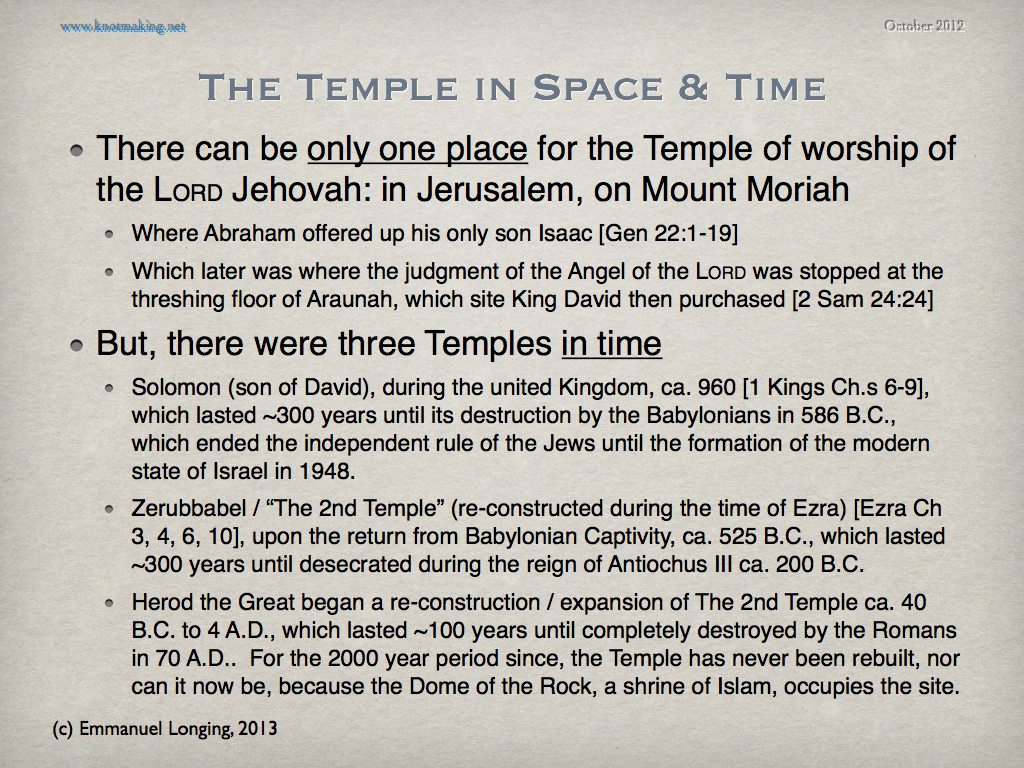 Late in King David’s life he fell into the sin of pride and self-reliance by seeking to know the number of fighting men he would have available in some all out way. So he commanded that a numbering, a census, be done of all the peoples in Israel. When this was concluded and he learned the number his heart grew weak with shame for having ordered the count. God came to David and gave him a choice of punishment. He chose the one whereby God would judge directly His people, knowing that God was also merciful. Over a period of the three days of God’s judgment, David’s census count was dramatically changed as many thousand were put to death by the sword of the Lord.
Late in King David’s life he fell into the sin of pride and self-reliance by seeking to know the number of fighting men he would have available in some all out way. So he commanded that a numbering, a census, be done of all the peoples in Israel. When this was concluded and he learned the number his heart grew weak with shame for having ordered the count. God came to David and gave him a choice of punishment. He chose the one whereby God would judge directly His people, knowing that God was also merciful. Over a period of the three days of God’s judgment, David’s census count was dramatically changed as many thousand were put to death by the sword of the Lord.
As that sword approached (in some visible way) the city of Jerusalem, the City of David, David submitted himself before God and asked all of God’s judgment fall only upon him and his family. This act of servanthood saved both the people from further judgment and David and his family. When the sword stopped its dreadful work it was over a threshing area (where chaff from milled grain was separated from the grain kernel) on a mountain top (large rounded hill in our experience), known as Mount Moriah. An sketch of the terrain of and around Jerusalem, including the very important Mount Moriah is shown below: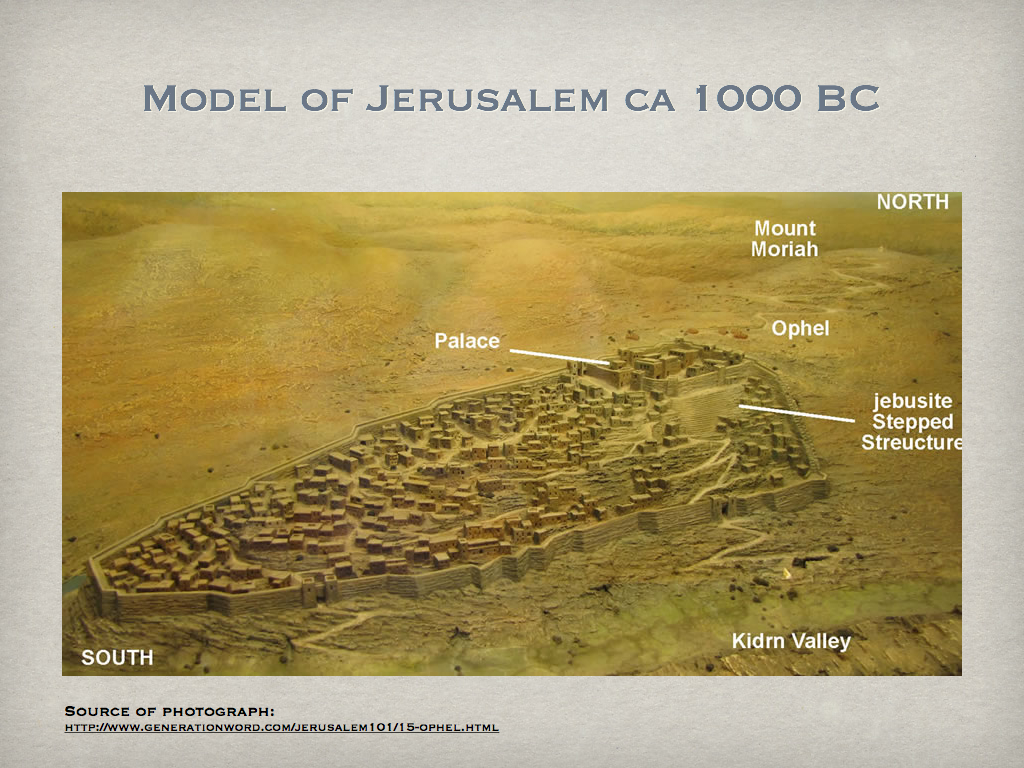 Shown below is how Mount Moriah was transformed into the place of the Temple and the Mount itself as the Temple grounds. The City of Jerusalem also expanded during this period.
Shown below is how Mount Moriah was transformed into the place of the Temple and the Mount itself as the Temple grounds. The City of Jerusalem also expanded during this period.
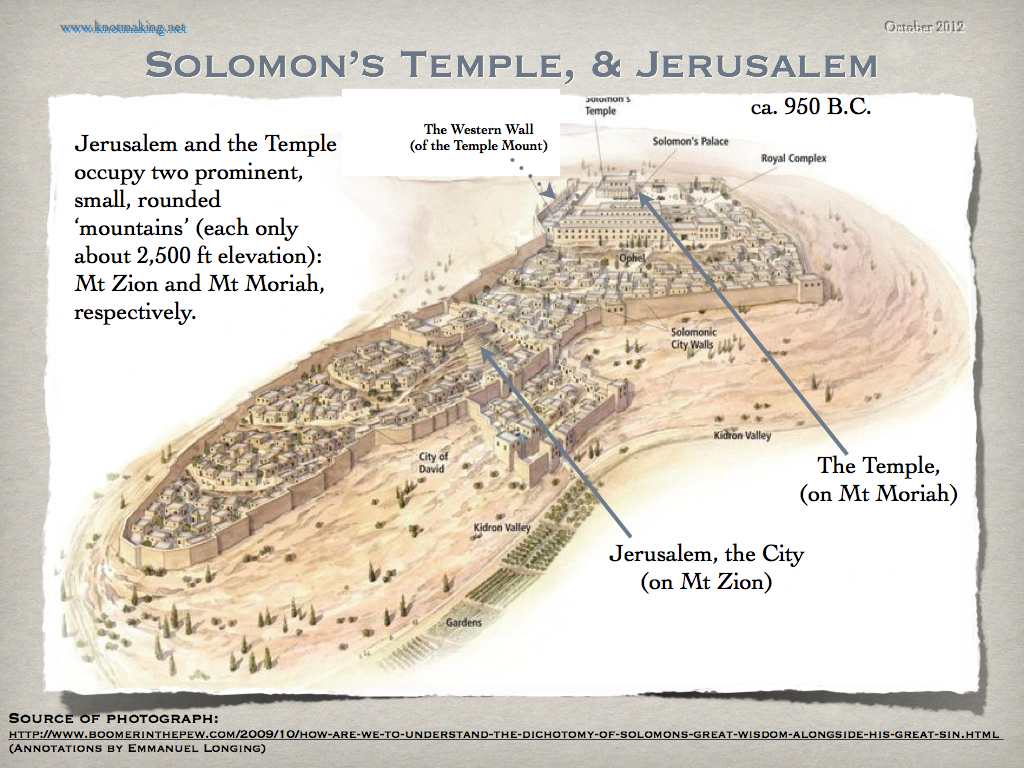 David had sought to build a permanent dwelling place for the Name of God, moving it from the still-in-use Tabernacle to a fixed site, The Temple, to be built on Mount Moriah at the place where God’s judgment was stayed. God appeared to David and told him that he was not to be the one to build the Temple, but that his son King Solomon would. (So there is a kind of parallel to Moses and Joshua: Moses because of his unbelief with respect to a specific command of God, was told that he would not enter the promised Land but that his successor, Joshua, would do so; here it is David who was is barred from ‘entering’ in a sense the construction of the place where God’s Spirit would reside, with that task falling to his successor, King Solomon).
David had sought to build a permanent dwelling place for the Name of God, moving it from the still-in-use Tabernacle to a fixed site, The Temple, to be built on Mount Moriah at the place where God’s judgment was stayed. God appeared to David and told him that he was not to be the one to build the Temple, but that his son King Solomon would. (So there is a kind of parallel to Moses and Joshua: Moses because of his unbelief with respect to a specific command of God, was told that he would not enter the promised Land but that his successor, Joshua, would do so; here it is David who was is barred from ‘entering’ in a sense the construction of the place where God’s Spirit would reside, with that task falling to his successor, King Solomon).
David collected the great treasures that would be used in the building of the Temple, together with its plans. His son / successor did the building of it. A visualization of the Temple as it was at the time of Solomon, namely the 1st Temple, is shown below: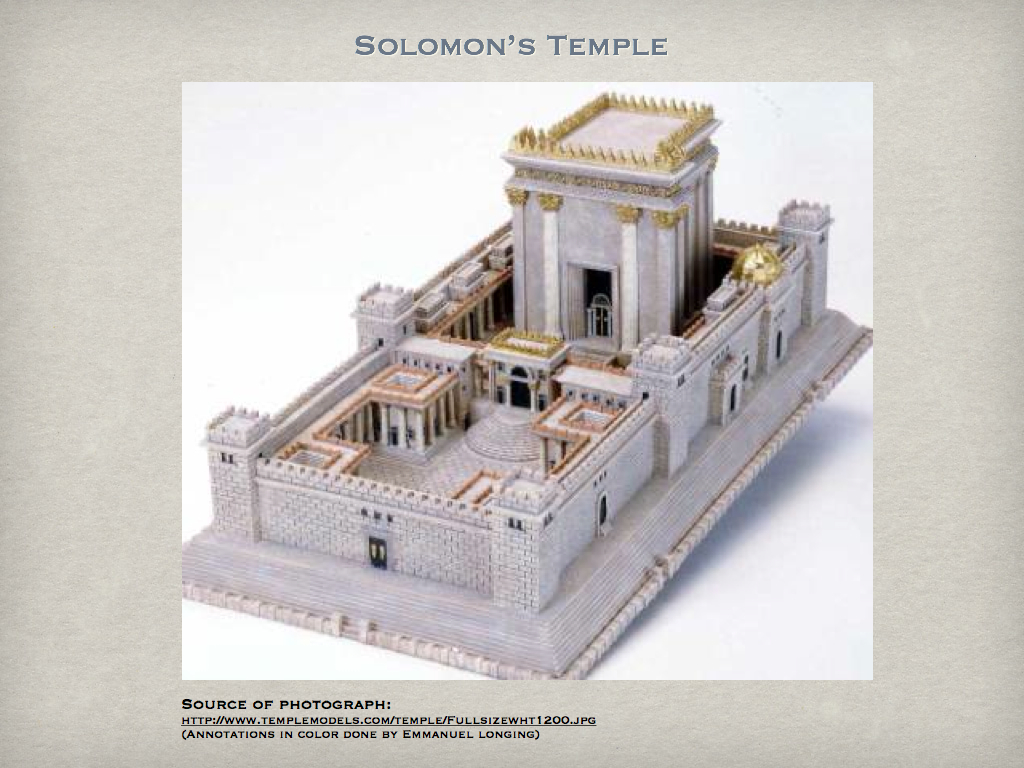 To show the contrast with the Temple and its Mount at the time of King Herod, compare the drawings above with the one below. King Herod the Great, greatly expanded the Temple area, building many other buildings, and dominating the Mount area. Because Herod was Rome’s sovereign in Jerusalem and all of Israel, Herod also included a substantial military outpost with the grounds on the Temple Mount because Herod understood that political intrigue and rebellion would foment there first, and he could best keep an eye on things by maintaining his own military presence there, especially during the major feasts when the population of the city swelled because of the influx of worshippers.
To show the contrast with the Temple and its Mount at the time of King Herod, compare the drawings above with the one below. King Herod the Great, greatly expanded the Temple area, building many other buildings, and dominating the Mount area. Because Herod was Rome’s sovereign in Jerusalem and all of Israel, Herod also included a substantial military outpost with the grounds on the Temple Mount because Herod understood that political intrigue and rebellion would foment there first, and he could best keep an eye on things by maintaining his own military presence there, especially during the major feasts when the population of the city swelled because of the influx of worshippers.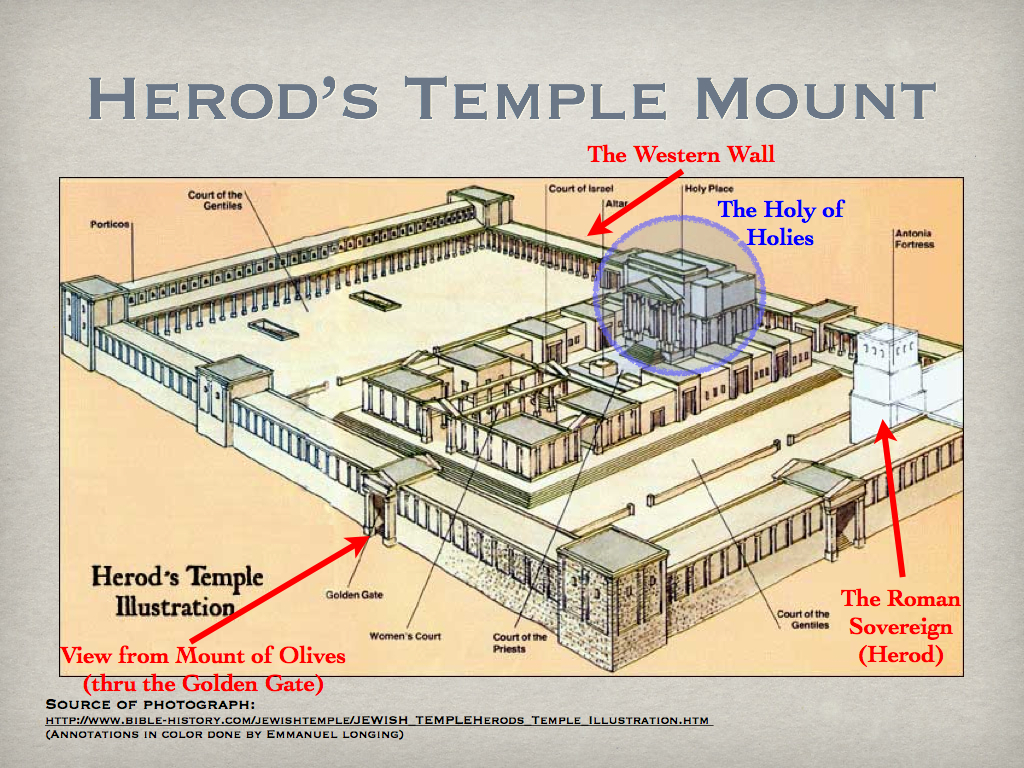 We turn now to the period at end of King David’s long life and the ascent to the throne of the unified kingdom of the Jewish people under David’s anointed successor and son, Solomon. David gave a number of charges to Solomon:
We turn now to the period at end of King David’s long life and the ascent to the throne of the unified kingdom of the Jewish people under David’s anointed successor and son, Solomon. David gave a number of charges to Solomon:
1 Kings 2:2 Now the days of David drew near that he should die, and he charged Solomon his son, saying: 2 “I go the way of all the earth; be strong, therefore, and prove yourself a man. 3 And keep the charge of the Lord your God: to walk in His ways, to keep His statutes, His commandments, His judgments, and His testimonies, as it is written in the Law of Moses, that you may prosper in all that you do and wherever you turn; 4 that theLord may fulfill His word which He spoke concerning me, saying, ‘If your sons take heed to their way, to walk before Me in truth with all their heart and with all their soul,’ He said, ‘you shall not lack a man on the throne of Israel. (NKJV)
After Solomon had secured his position on the throne, he began the project of building the Temple on Mount Moriah as shown in the like labeled chart above. Solomon’s commitment to build the Temple and its plan are given in 1 Kings chapters 5 – 8. It required seven years of building involving tens of thousands of men, in addition to all the supplies and plans developed and gathered previously by David. When the Ark of the Covenant was brought from the Tabernacle into the Holy of Holies, the innermost room of the Temple, we read:
1 Kings 8:10 And it came to pass, when the priests came out of the holy place, that the cloud filled the house of the Lord, 11 so that the priests could not continue ministering because of the cloud; for the glory of the Lord filled the house of the Lord. 12 Then Solomon spoke: “The Lord said He would dwell in the dark cloud. 13 I have surely built You an exalted house, And a place for You to dwell in forever.” (NKJV)
We must pause to grasp the significance of this event. The descendants of Abraham had been promised to be numerous and possess the Promised Land. From the time of Moses and the Exodus out of slavery in Egypt, Israel now a nation had the experience of God’s presence in the Ark of the Covenant in the Tabernacle. God in His faithfulness brought those promises to pass beginning with the conquering of the Land under Joshua, followed then by a long period known as Judges (covered in the Book of Judges and 1 Samuel chapters 1-8). Then under King Saul, Israel was unified as a nation, in large numbers, in the Promised Land. After Saul came David and then David’s son Solomon. Upon Solomon’s completion of the Temple, God’s Spirit occupied in some manifest way the Holy of Holies, as He had in the Tabernacle beginning with the time of Moses and the giving of the Commandments. This was indeed a great moment of fulfillment. However, there was a conditionality to such fulfillment, as there necessarily is under any system of law-keeping by fallen men:
1 Kings 9 And it came to pass, when Solomon had finished building the house of the Lord and the king’s house, and all Solomon’s desire which he wanted to do, 2 that the Lordappeared to Solomon the second time, as He had appeared to him at Gibeon. 3 And theLord said to him: “I have heard your prayer and your supplication that you have made before Me; I have consecrated this house which you have built to put My name there forever, and My eyes and My heart will be there perpetually. 4 Now if you walk before Me as your father David walked, in integrity of heart and in uprightness, to do according to all that I have commanded you, and if you keep My statutes and My judgments,5 then I will establish the throne of your kingdom over Israel forever, as I promised David your father, saying, ‘You shall not fail to have a man on the throne of Israel.’6 But if you or your sons at all turn from following Me, and do not keep My commandments and My statutes which I have set before you, but go and serve other gods and worship them, 7 then I will cut off Israel from the land which I have given them; and this house which I have consecrated for My name I will cast out of My sight. Israel will be a proverb and a byword among all peoples. 8 And as for this house, whichis exalted, everyone who passes by it will be astonished and will hiss, and say, ‘Why has the Lord done thus to this land and to this house?’ 9 Then they will answer, ‘Because they forsook the Lord their God, who brought their fathers out of the land of Egypt, and have embraced other gods, and worshiped them and served them; therefore the Lordhas brought all this calamity on them.’” (NKJV)
As if for emphasis, we have a parallel passage echoing the same warning in the book 2 Chronicles. Chapters 2 through 7 record the building of the Temple. Considering the extensive treatment of the same event in four chapters in 1 Kings (chapter 5 – 8), these two records provide us 11 chapters on the building, furnishing, and dedicating of the Temple. (Compare that with just two chapters on creation, in Genesis 1 and 2!) And, very importantly, God’s warning of the consequences of unfaithfulness toward Him is also emphatically repeated:
2 Chronicles 7:12 Then the Lord appeared to Solomon by night, and said to him: “I have heard your prayer, and have chosen this place for Myself as a house of sacrifice. 13 When I shut up heaven and there is no rain, or command the locusts to devour the land, or send pestilence among My people, 14 if My people who are called by My name will humble themselves, and pray and seek My face, and turn from their wicked ways, then I will hear from heaven, and will forgive their sin and heal their land. 15 Now My eyes will be open and My ears attentive to prayer made in this place. 16 For now I have chosen and sanctified this house, that My name may be there forever; and My eyes and My heart will be there perpetually. 17 As for you, if you walk before Me as your father David walked, and do according to all that I have commanded you, and if you keep My statutes and My judgments, 18 then I will establish the throne of your kingdom, as I covenanted with David your father, saying, ‘You shall not fail to have a man as ruler in Israel.’
19 “But if you turn away and forsake My statutes and My commandments which I have set before you, and go and serve other gods, and worship them, 20 then I will uproot them from My land which I have given them; and this house which I have sanctified for My name I will cast out of My sight, and will make it a proverb and a byword among all peoples.
21 “And as for this house, which is exalted, everyone who passes by it will be astonished and say, ‘Why has the Lord done thus to this land and this house?’ 22 Then they will answer, ‘Because they forsook the Lord God of their fathers, who brought them out of the land of Egypt, and embraced other gods, and worshiped them and served them; therefore He has brought all this calamity on them.’” (NKJV)
These warnings echo and parallel the warning given to Israel after the completion of the Temple and its journey to the edge of the Promised Land. In the last of the five books of Moses, Deuteronomy (literally: the second giving of the Law), we read:
Deuteronomy 27:1 Now Moses, with the elders of Israel, commanded the people, saying: “Keep all the commandments which I command you today. 2 And it shall be, on the day when you cross over the Jordan to the land which the Lord your God is giving you, that you shall set up for yourselves large stones, and whitewash them with lime. 3 You shall write on them all the words of this law, when you have crossed over, that you may enter the land which the Lord your God is giving you, ‘a land flowing with milk and honey,’[a] just as the Lord God of your fathers promised you. 4 Therefore it shall be, when you have crossed over the Jordan, that on Mount Ebal you shall set up these stones, which I command you today, and you shall whitewash them with lime. 5 And there you shall build an altar to the Lord your God, an altar of stones; you shall not use an iron tool on them. 6 You shall build with whole stones the altar of the Lord your God, and offer burnt offerings on it to the Lord your God. 7 You shall offer peace offerings, and shall eat there, and rejoice before the Lord your God. 8 And you shall write very plainly on the stones all the words of this law.”
9 Then Moses and the priests, the Levites, spoke to all Israel, saying, “Take heed and listen, O Israel: This day you have become the people of the Lord your God.10 Therefore you shall obey the voice of the Lord your God, and observe His commandments and His statutes which I command you today.” (NKJV)
What follows is a command that once they enter the Promised Land the tribes shall be separated onto two closely-facing mountains (mounts), Gerizim and Ebal. On the one mount the people were to shout the prescribed blessings given in Deut 27 -28, and on the other the cursings for turning away from God. Then in Deut 29 we read:
Deut 29:14 “I make this covenant and this oath, not with you alone, 15 but with him who stands here with us today before the Lord our God, as well as with him who is not here with us today 16 (for you know that we dwelt in the land of Egypt and that we came through the nations which you passed by, 17 and you saw their abominations and their idols whichwere among them—wood and stone and silver and gold); 18 so that there may not be among you man or woman or family or tribe, whose heart turns away today from theLord our God, to go and serve the gods of these nations, and that there may not be among you a root bearing bitterness or wormwood; 19 and so it may not happen, when he hears the words of this curse, that he blesses himself in his heart, saying, ‘I shall have peace, even though I follow the dictates[a] of my heart’—as though the drunkard could be included with the sober.
20 “The Lord would not spare him; for then the anger of the Lord and His jealousy would burn against that man, and every curse that is written in this book would settle on him, and the Lord would blot out his name from under heaven. 21 And the Lord would separate him from all the tribes of Israel for adversity, according to all the curses of the covenant that are written in this Book of the Law, 22 so that the coming generation of your children who rise up after you, and the foreigner who comes from a far land, would say, when they see the plagues of that land and the sicknesses which the Lordhas laid on it:
23 ‘The whole land is brimstone, salt, and burning; it is not sown, nor does it bear, nor does any grass grow there, like the overthrow of Sodom and Gomorrah, Admah, and Zeboiim, which the Lord overthrew in His anger and His wrath.’ 24 “All nations would say, ‘Why has the Lord done so to this land? What does the heat of this great anger mean?’ 25 Then people would say: ‘Because they have forsaken the covenant of theLord God of their fathers, which He made with them when He brought them out of the land of Egypt; 26 for they went and served other gods and worshiped them, gods that they did not know and that He had not given to them. 27 Then the anger of the Lordwas aroused against this land, to bring on it every curse that is written in this book.28 And the Lord uprooted them from their land in anger, in wrath, and in great indignation, and cast them into another land, as it is this day.’ (NKJV)
Why all this repetition of a prospective judgment? God is teaching us all something powerful about His holiness and, thereby, intolerance of sin, even amongst the people He had chosen to bear witness to Him on earth. Sadly, part of that witness, perhaps the most essential part, is that man is not inclined by nature to follow God but, rather, the dictates of his own (fallen) heart. Man does so–and this includes you and me–by our nature. What is worse, we tend to pass it off, at first, as no big thing; after a while, it becomes no thing at all; finally it becomes a self-appointed honor to go our own way. Such was the course of Israel’s history in the Land, and our own in the ‘land’ of our own heart and body.
God’s warnings to Israel (and to us) did not end with just the above passages. God sent many prophets to His people. After the death of King Solomon, the united kingdom was split into two: the Northern Kingdom, known (confusingly) as “Israel” or “Ephraim” (after the leading tribe there) or “Samaria,” and a Southern Kingdom, which included Jerusalem, known as “Judah” (for its leading tribe). The Northern Kingdom began in idolatry lead by its first king, Jeroboam, and it was the first to fall and go into exile. The Southern Kingdom end up in the same condition, though there were periodic revivals turning back the people’s hearts toward God. God gives us fourteen prophetic books, seven prior to and around the period of the destruction of the Northern Kingdom, and seven prior to and around the destruction of the Southern
Kingdom. These are shown in the below chart, along with the three prophets whose books are written after the restoration of the Southern Kingdom from its exile into Babylon.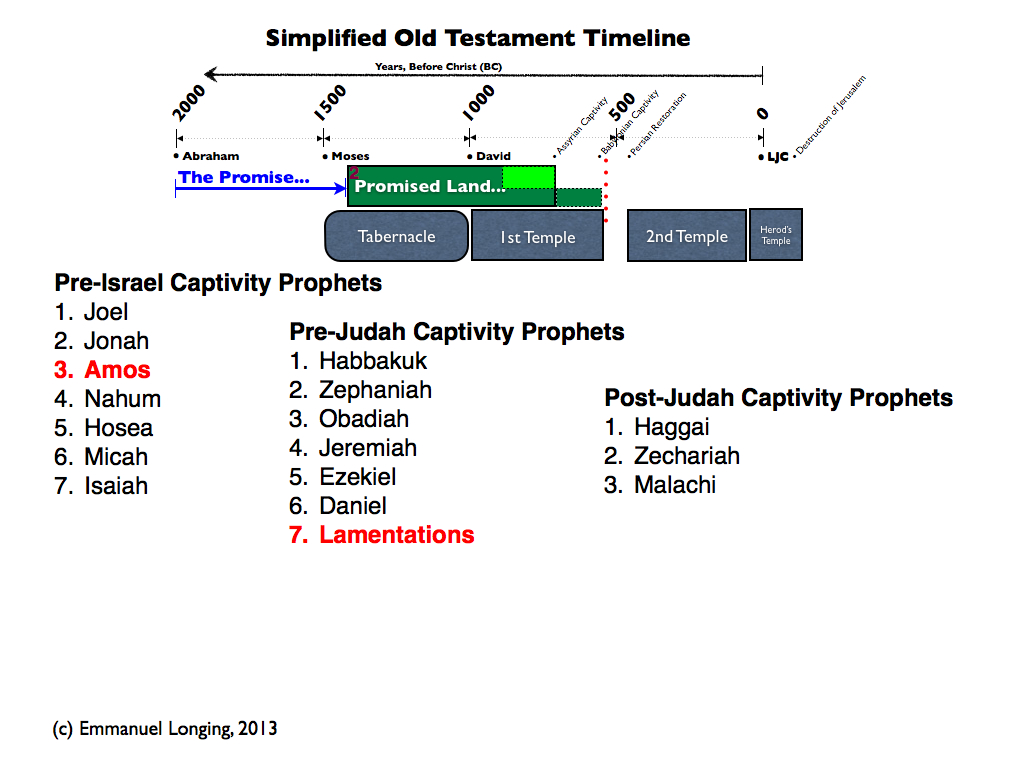 Amos, for example, gives the following warning to the Northern Kingdom:
Amos, for example, gives the following warning to the Northern Kingdom: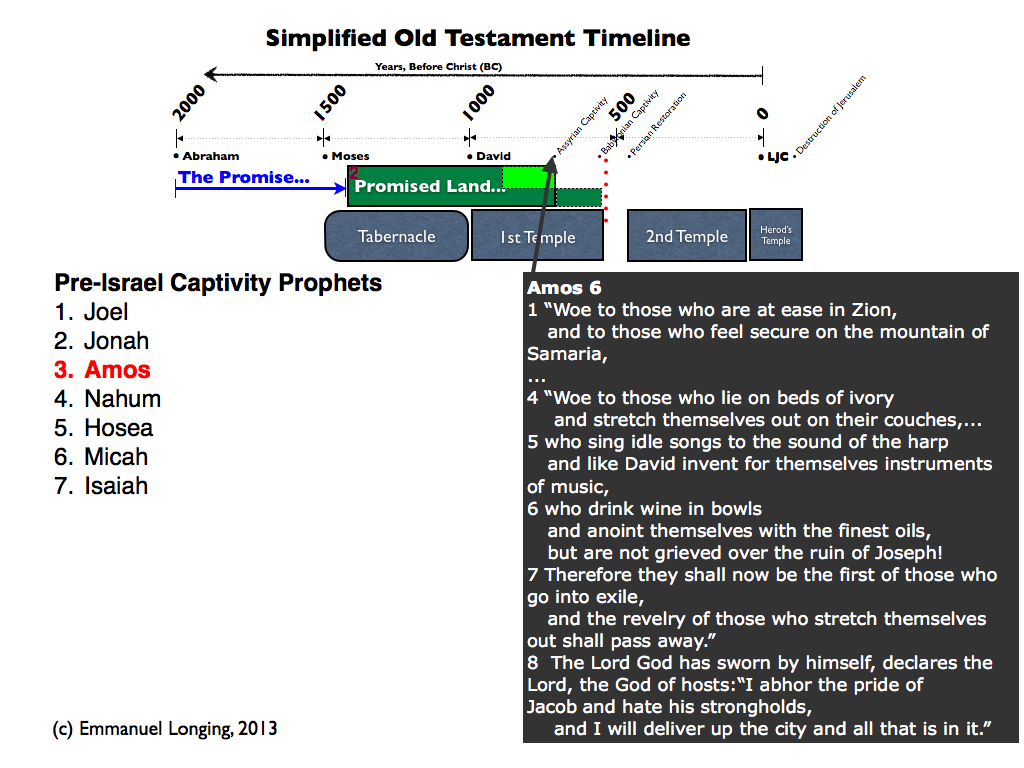 In Lamentations, as we learned at the beginning of this study, we have the record of the destruction of Jerusalem, the Temple, and the horrific exile of the inhabitants all but the poorest of the poor.
In Lamentations, as we learned at the beginning of this study, we have the record of the destruction of Jerusalem, the Temple, and the horrific exile of the inhabitants all but the poorest of the poor.
Finally, let us see the Bible’s historical record of what happened, and more importantly, why it did. First, the fall of the Northern Kingdom (“Israel”), is recorded in 2 Kings 17: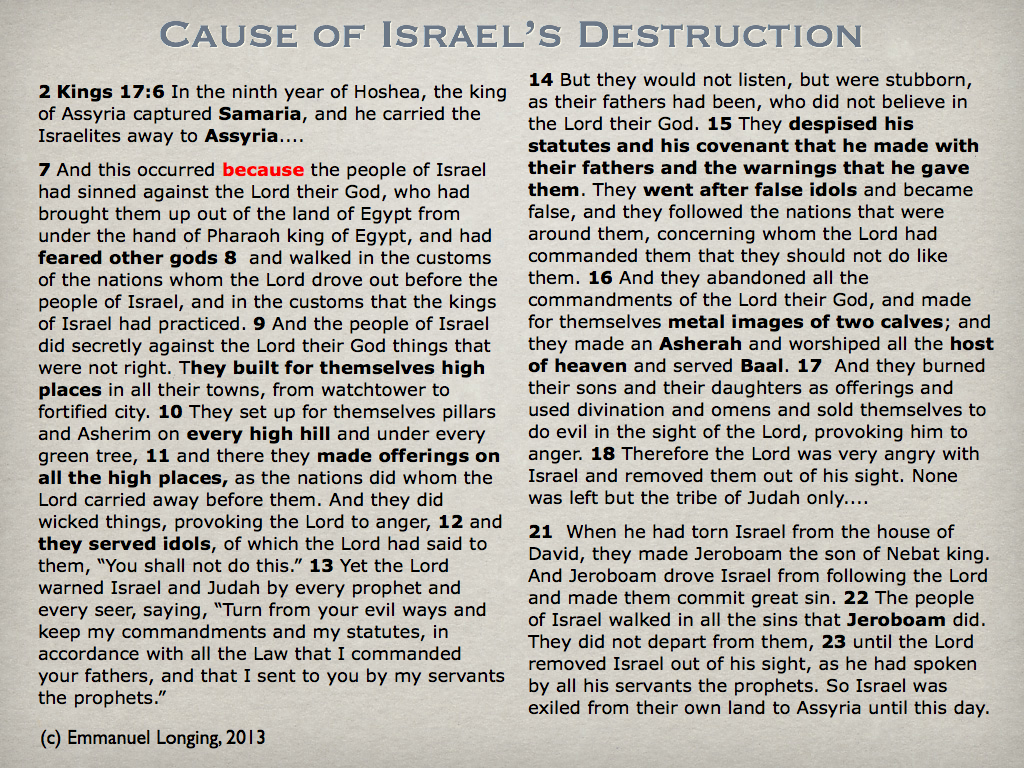 Then, we have the record of the fall of the Southern Kingdom (Judah) in 2 Kings 21:
Then, we have the record of the fall of the Southern Kingdom (Judah) in 2 Kings 21: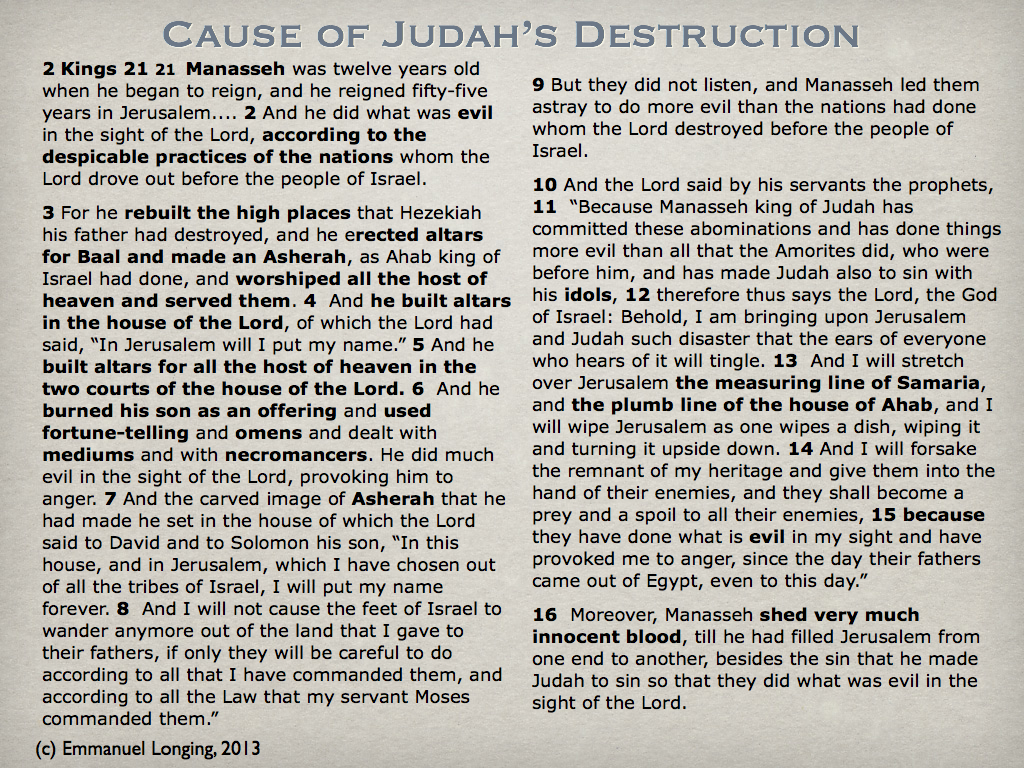 How might we summarize failure of God’s people (who were / are like us in every way) to be faithful their God?
How might we summarize failure of God’s people (who were / are like us in every way) to be faithful their God? 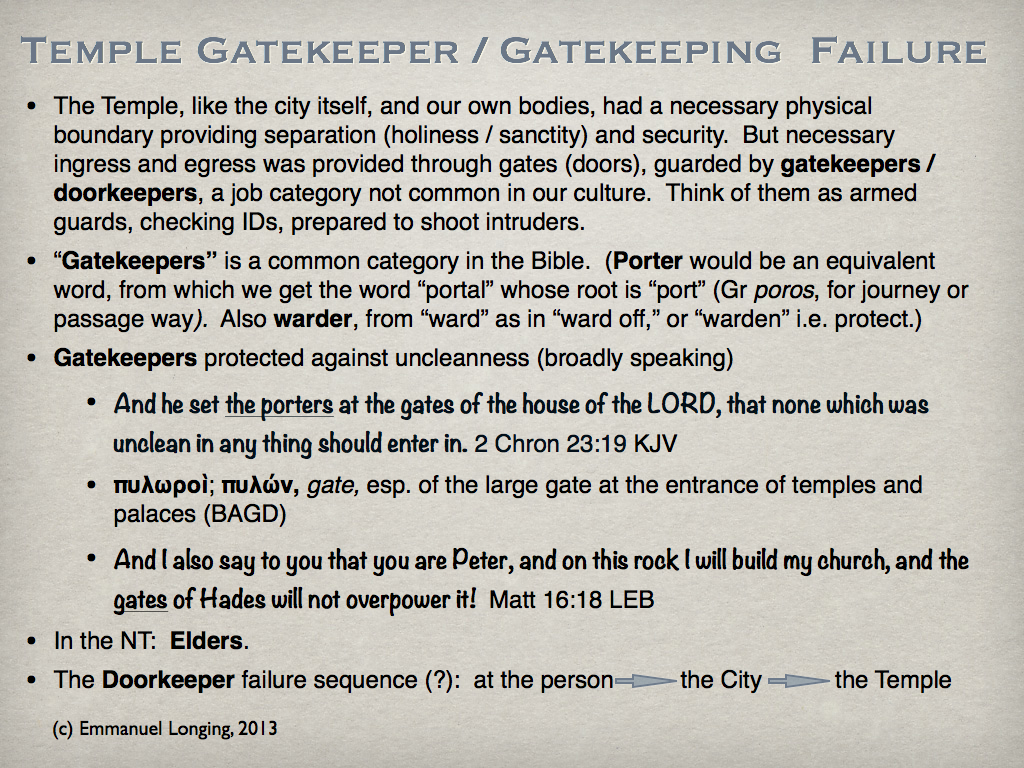 Let us now turn to the period of the so-called Second Temple.
Let us now turn to the period of the so-called Second Temple.